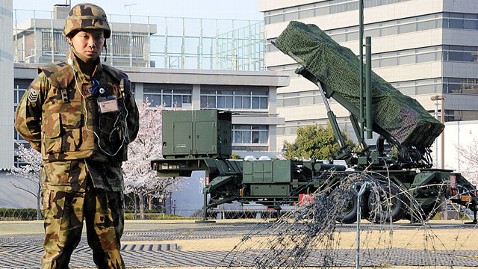Japan Facing Criticism Over Botched Response to North Korean Missile Launch

Yoshikazu Tsuno/AFP/Getty Images
The Japanese government is facing heavy criticism over its slow response to the failed North Korean rocket launch Friday.
While the country displayed a massive show of force in the lead-up to the planned launch, dispatching Pac-3 missile batteries and Aegis-equipped ships in Tokyo and Okinawa, it took nearly 40 minutes for leaders to officially confirm the launch Friday, much longer than neighboring South Korea. The J-alert emergency warning system, intended to inform the public minutes after liftoff, was never activated.
News of Pyongyang's rocket was sent to local authorities over the Em-Net emergency information system, nearly an hour after it occurred.
At a press conference, top spokesman Osamu Fujimura said the government verified the launch at 7:40 a.m., moments after the rocket took off, through the U.S. early warning satellite system. But Japanese officials didn't relay news to the public right away, because it wanted to "double check" with other sources.
A message sent out over the Em-Net system nearly 20 minutes later said the government had not confirmed the launch.
"We didn't want to put out false information," Fujimura told reporters. "We were trying to confirm through other channels."
While public acknowledgement of the launch was delayed, Fujimura said the Defense Ministry alerted Japanese Self-defense forces. The ballistic missile defense shields were readied but never activated.
Officials determined there would be "no impact to Japan" one minute after takeoff, Fujimura said.
Past embarrassment may have caused Japan to act more cautiously this time around. In 2009, the government was forced to apologize after sounding two false alarms in the lead-up to another North Korean rocket launch.
Acting on a Pyongyang announcement that a rocket launch was "imminent," officials prematurely sent out reports saying North Korea had fired the rocket. The news was broadcast nationally on TV, while local officials activated their emergency responses.
Then Defense Minister Yasukazu Hamada publicly apologized, after retracting the announcements.
Fujimura said the government's response this time, generally went as planned. But he acknowledged the need to review the information sent out over its emergency system.